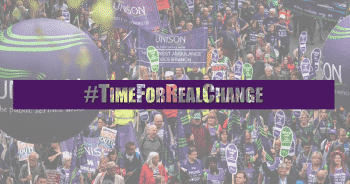

By Rebecca Anderson
THERE IS a real opportunity for coordinated strike action between two of Britain’s largest workforces: council workers, including school support staff, and hospital employees.
If successful, it could bust the public sector pay freeze and build momentum in private sector struggles for substantial pay rises. Local government and school staff have been offered a measly 1.75% pay rise after spending almost two years on the front lines on the pandemic, teaching children, maintaining services like refuse collection and caring for the most vulnerable.
Inflation is now at over 3% and the Bank of England’s Chief Economist warned it could soon surpass 5%. The offer is another real pay cut – on top of the 25% cut they have suffered since 2010.
Unions GMB, Unison and Unite, who represent 1.4 million local government and school workers, made a joint pay claim earlier this year for a 10% pay rise or £10 per hour, whichever is higher. On this basis the three unions conducted consultative ballots, which saw over three-quarters of voting members reject the offer.
Now all three unions are moving towards formal industrial action ballots, scheduled to take place in late November or early December, though worryingly Unison, the biggest union involved, has already moved its ballot back a month.
Similarly, NHS workers have rejected their 3% pay offer. But unlike local government unions, the NHS unions do not have a joint claim. Unison is demanding £2,000 for everyone, while the RCN is calling for a 12.5% pay rise. Smaller NHS unions Unite and GMB have taken up the rank and file’s call for a 15% pay rise. Joint demands and a joint strike are essential and the big unions must listen to the members’ calls for 15%.
Worse still, Unison and the Royal College of Nursing (RCN) have delayed matters by calling another indicative ballot, as if one was not enough, with Unison going as far as saying they will not move to a formal strike vote unless 45% of members participate in the indicative ballot, in the cynical hope they will fail.
But rank and file nurses’ campaign NHS Workers Say No moved an emergency branch motion back in September saying: ‘The leadership of Unison and Unison Health Service Group Executive should immediately begin preparations for a formal industrial ballot of NHS members on pay.’
The Unison NEC is under the control of the left in the shape of the loose, top-down Time for Real Change and the Socialist Party, but the Health Service Executive is in the hands of the right, which stays in power by hounding out the left and leaving branches moribund and members ill-informed. The NEC must go over the heads of the service group leaders and lead the campaign for a ‘Yes’ vote.
The government’s anti-trade union laws stipulate that turnout must be over 50% for strikes to be legal and achieving that is a real concern. But the conditions are ripe for a pay revolt, with fuel, food and rents all rising sky-high. Dare the Tories to ride out an NHS strike when workers have given their lives in the pandemic!
Rank and file council, school and NHS workers must link their campaigns and make the demand for a ‘Yes’ vote their focus, and through that campaign build a network of ordinary union activists at the heart of the fight. They should call mass meetings and elect joint union strike committees to win the vote and organise for action. They should refuse to settle until everyone settles – so no one gets left behind and no union leader jumps ship.